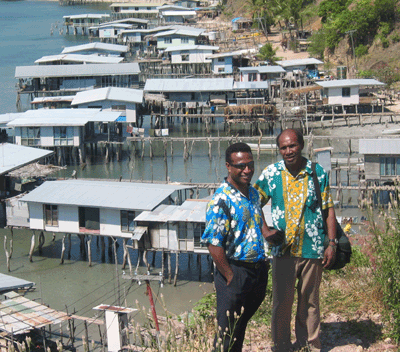







| PROGRAMMES | PROE | PUBLICATIONS, LIBRARY and IRC | SITE MAP | SPREP FORUMS | WEBMAIL - Global / Local | CONTACT | HOME
| Search |
International Waters Project
Year of Action against Waste - Special Profile : Championing Waste Reduction in Papua New Guinea
3/1/2005

For most of his life Kelly Madu, 59, has taught in secondary schools throughout Papua New Guinea. Now, as the Councillor for Ward 8, in Central Province, he is responsible for constituents from the villages of Barakau, Rabuka, and Kerekadi, located between 30 and 40 kilometres east of the national capital, Port Moresby.
Now Kelly Madu is trying to help these communities find effective ways to reduce the growing amount of solid and liquid waste that is threatening their health and well being.
Kelly points to the mounting piles of plastic accumulating in the sheltered western end of Barakau beach, “It’s not just plastics and other household waste,” he explains, drawing attention to a row of toilets on the beach, built above the sand along the high-tide water line. “Human waste from these toilets and the houses built over the sea are discharging directly onto the beach or into the sea”, he says.
Kelly says the people in Barakau have disposed of human and animal waste in the same way they have done for generations. “The problem now is that there are simply more people living in the village and more waste being discharged into the environment,” he says.
Kelly says it’s hard for many people in his community to understand the linkage between poor waste disposal and their health and wellbeing. “I know that waste is making a major contribution to the causes of various diseases that have occurred in the village – typhoid and severe skin rashes among them. However, because they cannot see the micro-organisms causing these diseases, it is hard for many of my community members to understand the connections between poor waste management and health problems”, he says.
With the assistance of the Pacific Regional Environment Programme (SPREP) and the International Waters Project (IWP), Kelly is now encouraging village residents to pen their pigs and consider options for relocating their household toilets.
Many village residents are cooperating with about 120 pigs penned just above high water. Although the pigs are penned they are still defecating directly onto the beach and into the water under or near their owner’s houses. There are still a large number of pigs free roaming and rooting in the waste that is accumulating underneath the houses at Barakau and Barakau kahana on the eastern sheltered bay side of the village.
Kelly has assembled a Local Project Management Committee, to try and address the waste problems at Barakau. With the support of the IWP, Kelly and his team have undertaken an extensive series of village and national level consultations to identify the root causes for the threats posed by waste in his community.
Kelly and Mr Narua Lovai, the National Coordinator for the IWP in PNG, both agree that the main challenge is getting people to change their behaviour – to work as a group for communal benefit.
Narua says that the last 12 months in Barakau have been a major learning period for his team. Although he comes from a similar community Narua says he never realised that such a community-based initiative was going to be so difficult to establish.
“People accept that there is a problem, that their immediate environment is threatened and that community well-being is in jeopardy. However, getting the community to work together to do something about it is a very intensive, challenging and long-term undertaking.
“I believe we are making progress at Barakau, but it requires a lot of patience, a willingness to listen and a local champion – someone who is respected by the community and willing to challenge them to do something positive to address these problems. Kelly and the local project management committee are our champions in Barakau,” he says.
“Hopefully, what we achieve in this community, will provide valuable lessons and solutions that can be applied in other communities facing similar kinds of problems – in PNG and elsewhere in the Pacific,” he says.
Contact Name |
Steve Menzies |
e-mail |
stevem@sprep.org |
Phone |
(685) 21929 |
Fax |
(685) 20231 |
.
